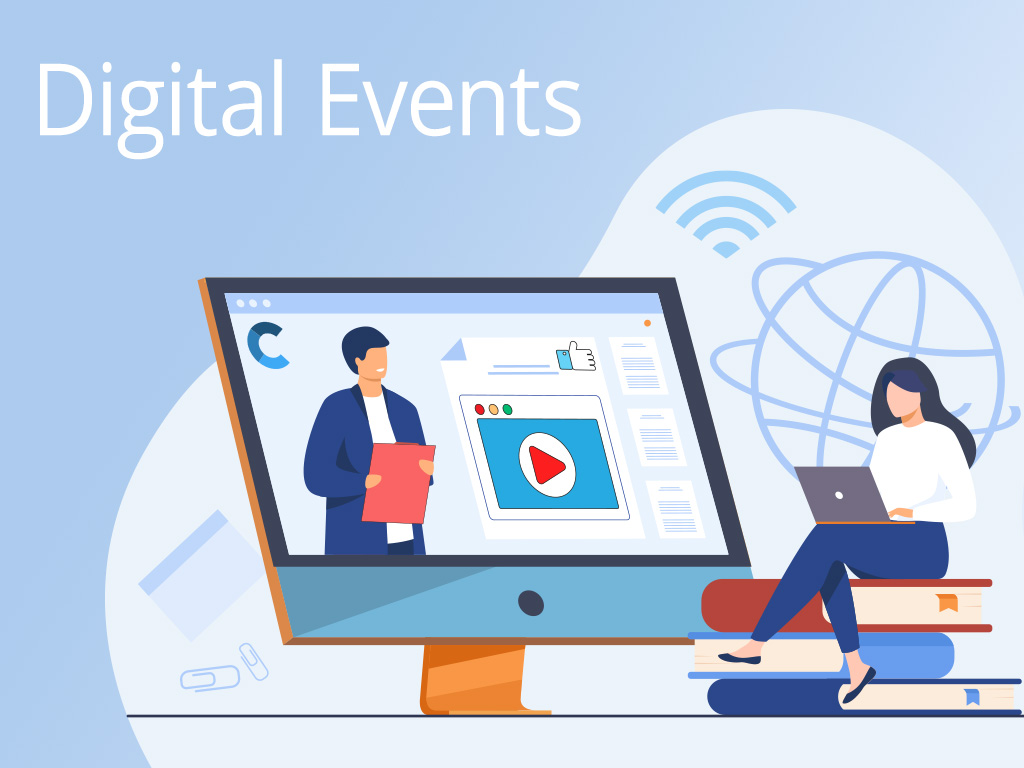Virtual Events – a new normal for the world of events. With the global pandemic, everything changed, including how we conduct events. From virtual meetings to virtual conferences and concerts, the world has adapted to the new normal. But do you know what types of virtual events are possible? How they work? And why they’re still increasingly popular?
In this article, we’ll explore the fascinating world of virtual events and their rise to prominence in the post-pandemic era.
Outline
ToggleWhy virtual events are a valuable B2B marketing strategy
Virtual events are a way of conducting events, primarily through the internet, that bring together people from different parts of the world on a single platform. Which is a big step towards inclusion. Virtual events are an excellent way of engaging with people and showcasing products and services, and they provide an opportunity to connect with a global audience. They have opened up a whole new world of opportunities for businesses and individuals alike.
As a result, digital event solutions have become an essential component of B2B marketing campaigns. They have grown in popularity in recent years, particularly in the aftermath of the COVID-19 outbreak. Digital events have developed as a viable approach for B2B marketers looking for new ways to connect with prospects and customers. They provide a way to reach a broad audience, create leads, and build relationships while lowering expenses and enhancing efficiency. With the increasing trend of remote work and online communications, digital events are anticipated to continue to be a significant tool for B2B marketing in the future.
Explore also our blog about digital events in one of our previous post on how digital events engage and convert.
Types of digital and virtual events for B2B marketing
There are various types of digital and virtual event types to choose from. For instance, webinars allow marketers to share informative content and engage with prospects in real-time, while virtual trade shows offer a way to showcase products and services to a wider audience in a cost-effective way. Online conferences and summits bring together experts and industry professionals to discuss trends and share insights. Interactive experiences like gamification and virtual reality can create engaging and memorable experiences. The key is to select the right type of digital event that suits your goals, message, and target audience.
Find the below types of virtual events that B2B marketers can use to connect with their audience:
- Webinars: Live or pre-recorded presentations on a specific topic
- Online conferences: Multi-day events with a variety of sessions and speakers
- Virtual trade shows: Online exhibitions with booths, demos, and networking opportunities
- Social media events: Live chats, Q&A sessions, and other interactive events on social media platforms
Benefits of a digital event for B2B marketing
Virtual events offer several benefits for B2B marketing, including increased reach, cost savings, lead generation, efficient use of resources, and enhanced audience engagement. They provide a way to deliver informative and relevant content and build relationships with prospects and customers in a convenient and accessible manner. Virtual events also offer the opportunity to gather data and feedback to measure success and improve future events. Overall, digital and virtual events are an effective way for B2B marketers to reach a wider audience and achieve their marketing goals.
Here is an overview of some, but not all benefits of digital and virtual events for B2B marketers, including:
- Increased reach: Attract attendees from all over the world, increasing the reach of your message.
- Lead generation: Provide an opportunity to generate leads through registration and engagement.
- Cost savings: Digital event solutions are often less expensive than in-person events, saving on travel and venue costs.
- Efficient use of resources: Can be recorded and repurposed, maximizing the value of your content.
- Enhanced audience engagement: Offer interactive features that can increase audience engagement and improve the overall experience.
Planning and executing a successful digital event for B2B marketing
To plan and execute a successful digital event for B2B marketing, follow these steps:
- Determine your goals and objectives
- Choose the right type of event for your audience and message
- Select a platform that meets your needs and budget
- Create compelling content and presentations
- Promote your event through multiple channels
- Provide opportunities for engagement and interaction
Best practices for virtual events in B2B marketing
The execution of virtual events for B2B marketing requires careful planning and attention to detail. It involves selecting the appropriate type of event, defining the target audience, developing compelling content, and promoting the event through various channels. Successful execution also involves leveraging technology and tools to create an engaging and interactive experience for attendees. Post-event follow-up and analysis are also important to measure success and identify areas for improvement.
To ensure the success of your digital event, consider these best practices:
- Make it easy to attend: Ensure that registration is simple and that attendees receive clear instructions on how to access the event.
- Create engaging content: Provide value to your audience by delivering informative, interesting, and relevant content.
- Use interactive features: Encourage engagement and interaction by incorporating live polls, Q&A sessions, and other interactive features.
- Leverage technology: Use technology to enhance the attendee experience, such as by offering live translation or virtual reality experiences.
- Follow up with attendees: After the event, follow up with attendees to nurture leads and gather feedback for future events.
With the right strategy and execution, digital events can be an effective tool for B2B marketers to generate leads, build relationships, and achieve their marketing objectives.
Potential drawbacks of virtual events
Though virtual events remain a popular alternative to in-person events, it’s important to acknowledge their potential drawbacks. While virtual events can be convenient and cost-effective, they don’t quite measure up to the experience of in-person or face-to-face events and meetings. One of the biggest disadvantages is the lack of social interaction. Attendees may miss out on the chance to network and make personal connections with other attendees and speakers. Additionally, virtual events can be less engaging than in-person events. Attendees may find it harder to stay focused and may be more easily distracted by other things happening in their environment. Lastly, virtual events can feel impersonal, lacking the energy and excitement of a live event.
In conclusion: How to make the most of virtual events in B2B marketing
Virtual events have proven to be a valuable B2B marketing strategy, offering increased reach, cost savings, and lead generation. By following best practices and selecting the right type of event for your audience and message, you can plan and execute successful virtual events that provide value to your audience and contribute to your overall marketing strategy. However, while virtual events offer a lot of benefits, they can’t completely replace the experience of attending an in-person event. It’s important for event organizers to consider these drawbacks and find a good balance between both, in-person and virtual, considering customer preference and customer needs. Still, properly executed virtual events are a crucial part in a customer journey.
Recommended resources
- HubSpot: How to Run a Successful Virtual Event in 2023
- Hootsuite: How to Host a Successful Virtual Event
- vFAIRS: Virtual Events – The Ultimate Guide (2023)
No related posts.



